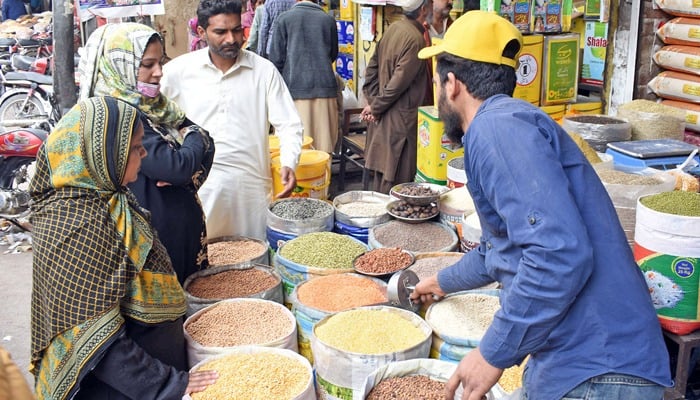CPI inflation picks up in June in line with govt, market consensus
Headline inflation recorded at 12.6% YoY in June compared to 11.8% in May, PBS data shows
In line with market and government expectations, the country's headline inflation edged higher to 12.6% year-on-year (YoY) in June, compared to 11.8% in May, according to data released by the Pakistan Bureau of Statistics (PBS) on Monday.
According to the PBS numbers, the Consumer Prices Index (CPI) based inflation increased by 0.5% on a month-on-month basis in June.
The CPI-based inflation in May rose 11.8% from a year earlier, the lowest reading in 30 months and below the finance ministry's projections.
The country has been beset by inflation above 20% since May 2022. Last year in May, inflation jumped as high as 38% as the country navigated reforms as part of an International Monetary Fund (IMF) bailout programme. However, inflation has since slowed down.
Brokerage firm Topline Securities noted that the reading matched their projections, so it did not surprise them.
This CPI reading brings the average inflation for fiscal year 2023-24 to 23.4%, compared to 29.2% in fiscal year 2022-23.
The Ministry of Finance, in its Monthly Economic Update and Outlook report, had forecast a marginally higher inflation rate for June 2024 compared to the previous month but noted it was still lower than the same period last year.
The ministry attributed the hike to higher prices of perishable items driven by Eid ul Adha and added that the government is working to manage supply and demand to bring about price stability, reduce market volatility, and improve the inflation outlook.
JS Global Research, another brokerage firm, had projected CPI inflation to hover around 12.5% YoY, with the FY24 average at 23.8%, continuing the slowdown that started in May (11.8%). This compares to 17.3% in April and a significant drop from 29.4% in June 2023.
“June is expected to see a 37 basis points month-on-month decrease in food inflation, following an 8% month-on-month drop in April. This translates to a year-on-year food inflation rate of just 0.5% in June, a significant improvement from 39% in Jun-2023,” JS Global said in its report.
AKD Securities Limited, another brokerage house, estimated that inflation would register a 12.55% year-on-year increase, up from 11.76% in the previous month.
“On a monthly basis, it is likely to ascend by 0.45%, following a slight rebound in vegetable prices due to ongoing festivities during the current month,” the AKD report said.
As per the AKD report, with both food and fuel indices slowing down in May, "we anticipate near-term CPI readings to remain highly susceptible to the upcoming inflationary hikes announced in the federal budget".
“Additionally, any further rebounds in essential commodity prices driven by a pullback in crude oil in the wake of global monetary easing, alongside moderate weakness in the domestic currency, if any, may keep disinflationary prospects in check,” according to the AKD report.
The parliament on Friday, June 28, passed the government's tax-heavy finance bill for the current fiscal year amid an annual inflation projection of up to 13.5% for June 2024.
The bill came ahead of more talks with the IMF for a loan of $6 billion to $8 billion to avert a debt default for Pakistan, the slowest-growing economy in South Asia.
A finance ministry report had projected annual consumer price inflation for June 2024 between 12.5% to 13.5%, up from 11.8% in May.
"The government was implementing various administrative, policy and relief measures to control inflationary pressures," the report said.
The rise in the tax target is made up of a 48% increase in direct taxes and a 35% hike in indirect taxes over revised estimates of the current year. Non-tax revenue, including petroleum levies, is seen increasing by 64%.
Opposition parties, mainly parliamentarians backed by the jailed former Prime Minister Imran Khan, have rejected the budget, saying it will be highly inflationary.
Pakistan has projected a sharp drop in its fiscal deficit for the new financial year to 5.9% of gross domestic product (GDP), from an upwardly revised estimate of 7.4% for the current year.
— With additional input from Reuters
-
Bitcoin plummets toward $60,000 as investors dump risky bets
-
Bitcoin crashes below $63K as regulatory pressure and market fears grow
-
Bitwise Crypto Industry innovators ETF: What investors should do in 2026?
-
Nintendo shares slide again as momentum fears grow
-
Gold, silver prices fallen sharply; What’s driving the drop?
-
Gold’s record climb: Experts question if its safety is ‘overstated’
-
Dubai unveils plans to construct street built with real gold
-
Netflix slams Paramount’s bid: 'Doesn't pass sniff test’ as Warner battle escalates












